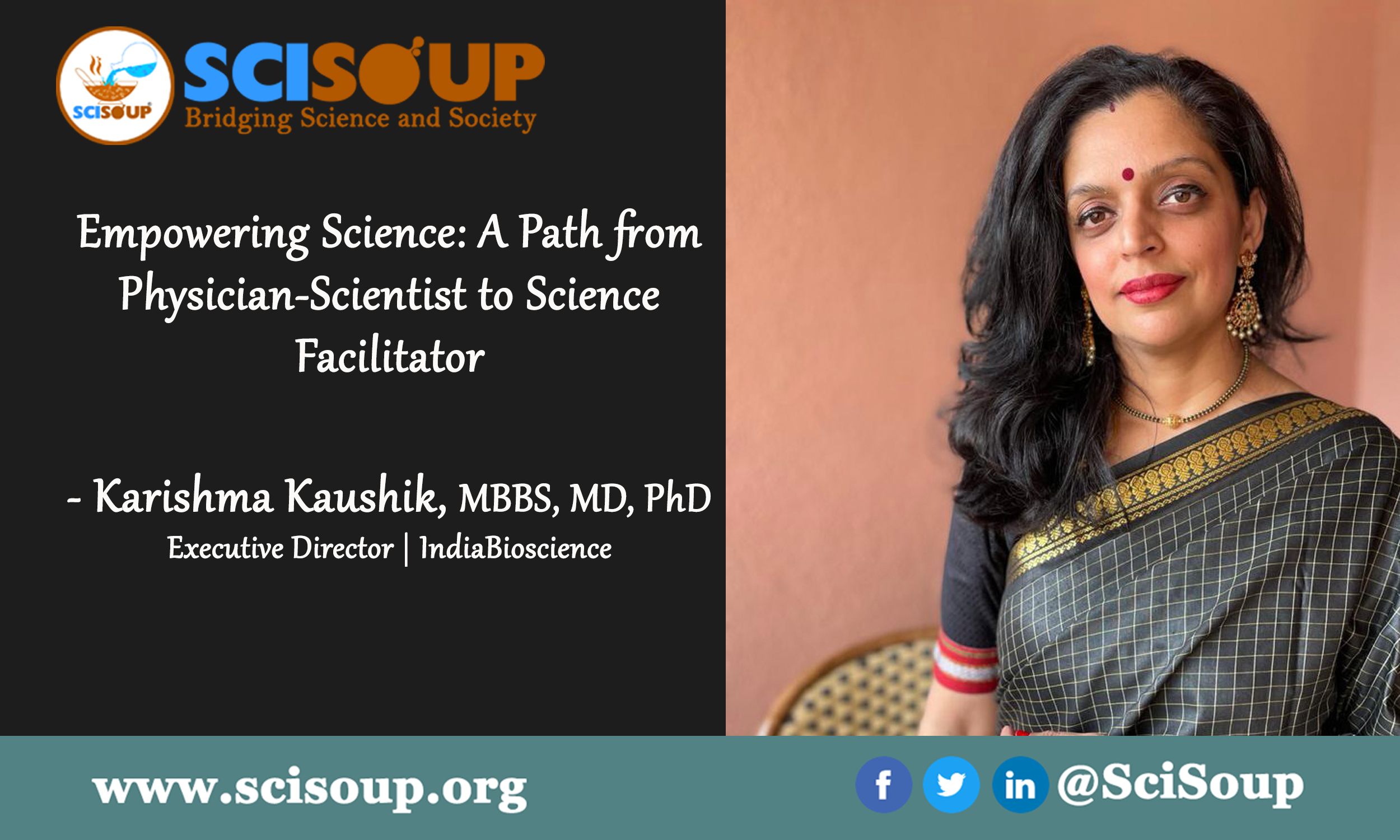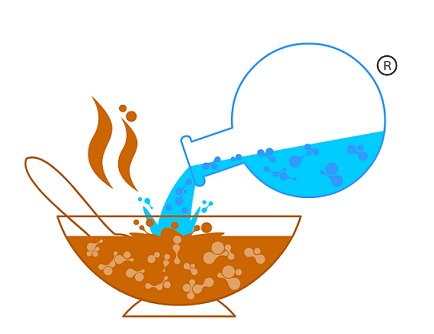
“Challenge yourself with new goals, tasks, and projects that are 'out of your comfort zone,' even in your current role. This will come in handy when you take those leaps in your career”
AUG 04, 2023 | BY DIVYA P. KUMAR AND RATNESHWAR THAKUR
In this interview-based science blog under the SciSoup’s Career Development and Mentoring Blog series 2023, we delve into the inspiring journey of Dr. Karishma Kaushik, a physician, clinical microbiologist, scientist, and now science facilitator. As the Executive Director of IndiaBioscience, a science facilitation organization in the Indian life science ecosystem, she shares her experiences and insights from a diverse set of educational and professional roles.
1) Could you briefly introduce yourself to the audience?
I have described myself as a physician, clinical microbiologist, scientist, and now science facilitator, in that order of education and professional roles. I am currently the Executive Director of IndiaBioscience, a science facilitation organisation in the life science ecosystem in India.
After an MBBS and MD in Clinical Microbiology from the Armed Forces Medical College, Pune, I moved to the United States for a Ph.D. I completed my Ph.D. in Molecular Genetics and Microbiology from the University of Texas at Austin. After a brief stint as a teaching faculty at UT Austin, I moved back to India on the Ramalingaswami Re-entry Fellowship. I started my independent research group at the Department of Biotechnology, Savitribai Phule Pune University. Across five years, my group studied biofilm infection states, focusing on wound and oral biofilms in human-relevant conditions. While this was a hugely productive phase for our research group, I also explored and got involved in a range of initiatives across the broader science ecosystem in our country. This included science policy, science communication, science outreach for school students via Talk To A Scientist, community facilitation, and initiatives that bridge science and society.
Beyond my professional roles, I strongly identify with being a mother and being an advocate for mothers in science.
2) Describe your responsibilities in the current position that you hold.
IndiaBioscience fills a unique niche in the ecosystem of the life sciences in India by being a catalyst to promote change in the culture and practice of the field. At IndiaBioscience, we work across six broad verticals: Networking and Mentorship, Community Building, Skill Building, Science Communication, Digital Initiatives, Data and Policy. Through our work, we engage with the life science community, science professionals, educators, and students, across India, with a great degree of cross-talk among our various initiatives. As Executive Director, I lead the Networking and Mentorship vertical at IndiaBioscience, which includes the flagship Young Investigators’ Meeting series and the Regional Young Investigators’ Meetings, along with facilitating other national initiatives related to early-career researchers, postdoctoral fellows, and students. In addition, I work with the team members on programs related to their verticals. Finally, my role involves the scale-up of IndiaBioscience as a program to adapt to and better serve the needs of the life science community. As I love to say, we are a small team at IndiaBioscience that gets a lot of work done!
3) You were active in academic research and then took a role in IndiaBioscience. How did this transition happen?
On the professional front, I have had several transitions. Whether it was the most recent professional transition to IndiaBioscience, or previous ones, such as moving from practicing medicine to a laboratory physician or from medicine to basic science, these transitions have directly related to the next phase of professional growth and contributions. While I returned to India as an independent investigator and led a research group at a state university, I was also committed to understanding and contributing to the broader science practice in our country. Closer to the end of my tenure as a Ramalingaswami Re-entry Fellow, I allowed myself to think hard about the next phase of my professional journey. During this time, I came up with a version of the ‘Ikigai’ exercise; I listed my immediate career goals and personal priorities, jotted down the skills I had built across my education and career, and viewed them against my enduring and overarching vision for my professional contributions. This little thought exercise led to tremendous clarity; I realised that I wanted to play a more significant role in the ecosystem, one that builds bridges, connects communities, and interfaces with international partners. I actively started looking up openings for leadership positions; around the time, IndiaBioscience was looking for a leader for the organisation. I applied and made the best pitch possible!.
4) How will your experiences in academia and research aid in your current position?
As I mentioned, a professional journey is a continuum, and we keep building and honing skills and insights across various experiences. While my medical education and Ph.D. gave me scientific and technical know-how, it was my tenure as an independent investigator that provided me with experiences related to project management, team-building, fund raising and expenditure, and working with diverse stakeholders. Importantly, exploring roles and opportunities beyond my immediate research gave me an in-depth understanding of the needs of the life science community, challenges of doing science in India, and interventions that could facilitate, promote and transform the scientific enterprise in our country. Together, this has served to be a solid foundation, which I am leveraging to augment the impactful work at IndiaBioscience.
5) What are the credentials and additional training (s) that you feel are required to hold a leadership role in organizations like IndiaBioscience?
Apart from a solid scientific background and experience in the relevant ecosystem, I will underscore the importance of three broad skills: quality of work, multitasking, and time management. These are applicable across domains, fields, work areas, and even career stages. For a leadership role, they are essential and relevant across a range of jobs, whether it is a relatively mundane task such as sending an email or updating a website or a major initiative such as building a program, executing a plan, working in a collaborative project, or seeking funding for initiatives. Fortunately, several tools are available to help develop these skills into one's professional armamentarium, which include online calendars, grammar tools, presentation softwares, and course modules. However, we continue to undervalue these aspects in scientific training due to the nature of research, which is built around individual contributions, flexible timelines, repetition, and long hours. Quality of work, multitasking, and time management skills can transform one's career trajectory when moving on from a Ph.D. to a professional role such as principal investigator (a leadership role itself!) or other leadership roles.
6) What are the challenges that exist in the current role you play?
A community-facing organisation means the opportunities are many, and the potential impact is large. Given this, prioritizing programs and initiatives can be a challenge because there is always so much more that to do, and current programs also need to be run with quality and consistency.
For the team, a community-facing role also means showing up consistently and wholeheartedly for every interaction, webinar, meeting, and even every email.
7) Can you describe the mission and goals of IndiaBioscience and the impact that it has on the Indian scientific community?
IndiaBioscience was started over a dinner table conversation between colleagues, with a vision to bring together the life science community in India. The very first initiative was the Young Investigator Meeting (YIM) in Thiruvananthapuram in 2009. Following the resounding success of this meeting, IndiaBioscience was borne out of the idea to keep conversations and interactions with young investigators, postdoctoral fellows, and the broader life science community going. Since then, IndiaBioscience has grown to fill a unique niche in the ecosystem of the life sciences in India with the vision and mission of 'Engaging Communities, Enabling Change.' Today, the program hosts a diverse range of initiatives and partnerships, including the Regional YIM Grants and IndiaBioscience Outreach Grants, and has, notably, expanded to include science professionals, educators, and students, across colleges, universities, and institutes in the country. The community participates in initiatives via the community and skill building verticals, IndiaBiostreams (webinars), and IndiaBiospeaks (podcasts), and IndiaBioreads (books and booklets) initiatives, as well as by sharing excellent pieces of science communication via the weekly articles and columns. The platform also facilitates the community in their search for jobs, grants, events, and internships, via weekly postings on the website. The program is constantly adapting and evolving to the community's needs, current conversations around science in India, and changing nature of science careers in India, with several new modes of engagement.
8) If you were asked to provide 3- tips/ guidance to aspirants who would like to follow a similar career path, what would you suggest?
Every career path is unique, and so suggestions must be viewed in the context of the individual. But if I have to recommend some tips to aspirants looking for a diverse and dynamic career path, I would start with ‘ABC’:
- Actively engage with the broader scientific enterprise via conversations, conferences, think tanks, committees, organisations, and print and electronic media.
- Build various career-agnostic skills such as writing, oral communication, strong email communication, time and task management, and managing multiple projects across different stages.
- Challenge yourself with new goals, tasks, and projects that are 'out of your comfort zone,' even in your current role. This will come in handy when you take those leaps in your career!
Disclaimer - SciSoup claims no competing interest. The opinions expressed by participants in this blog are solely their own and do not necessarily reflect the views or opinions of the blog creators or its affiliates. The purpose of this blog series is to raise awareness about non-academic careers and provide mentoring insights.

Send your opinions, questions, and suggestions for future column topics and stories - to scisoup@gmail.com and engage with us on